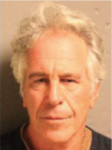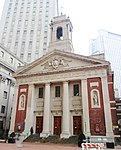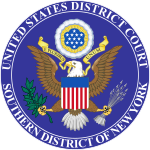Metropolitan Correctional Center, New York

The Metropolitan Correctional Center, New York (MCC New York) is a United States federal administrative detention facility in the Civic Center of Lower Manhattan, New York City, located on Park Row behind the Thurgood Marshall United States Courthouse at Foley Square. It is operated by the Federal Bureau of Prisons, a division of the United States Department of Justice. MCC New York holds male and female prisoners of all security levels. Most prisoners held at MCC New York have pending cases in the United States District Court for the Southern District of New York. MCC New York also holds prisoners serving brief sentences.The Los Angeles Times stated that the prison is often referred to as the "Guantanamo of New York", and The New York Times stated that its administrative segregation units had severe security measures.
Excerpt from the Wikipedia article Metropolitan Correctional Center, New York (License: CC BY-SA 3.0, Authors, Images).Metropolitan Correctional Center, New York
Park Row, New York Manhattan
Geographical coordinates (GPS) Address Nearby Places Show on map
Geographical coordinates (GPS)
| Latitude | Longitude |
|---|---|
| N 40.713055555556 ° | E -74.001944444444 ° |
Address
IRT Substation #11
Park Row 122
10007 New York, Manhattan
New York, United States
Open on Google Maps











